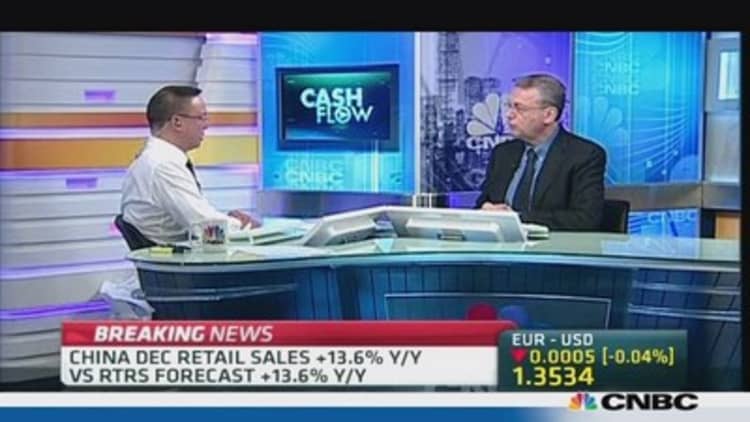
With China's gross domestic product (GDP) growth falling to its slowest pace in 14 years in 2013, what's next for the world's second largest economy?
Economists are divided into two distinct camps: those who see a continued growth deceleration towards 7 percent in 2014, and those who expect a pickup to above 8 percent.
(Read more: China economy grows 7.7% in fourth quarter)
The wide disparity stems from a variety of factors including the extent to which reforms undertaken at the Third Plenum in November will impact economic growth and the degree to which China will benefit from the pickup in global demand.
In the bullish camp is Louis Kuijs, chief China economist at RBS who sees the economy growing 8.2 percent in 2014, picking up from the 7.7 percent in 2013.
"We expect China to benefit from improved global growth this year. Faster world trade growth should support China's growth via stronger exports and corporate investment," Kuijs wrote in a note on Monday.
Dispelling concerns that the government's reform efforts will produce a drag on the economy, Kuijs argues that the reforms likely to be carried this year are "broadly neutral to growth", namely the opening up and of the financial sector and capital account, and removal of barriers for private capital.
Li-Gang Liu, chief economist, Greater China at RBS, who sees growth slowing to 7.2 percent this year, has a different take on both of these issues.
According to Liu, exports will likely drag down growth as appreciation in the yuan erodes China's competitiveness. The country's export sector has showed signs of cooling in the past month, with growth in shipments slowing to 4.3 percent in December from 12.7 percent in November.
(Read more: China December trade surplus far short of estimates)
"We also believe that the 'comprehensive reform package' is likely to weigh on China's economic growth in the next 1-2 years," he added.

ANZ expects the government will set an annual growth target of 7 percent to allow more room for policymakers to engage in the necessary reforms to rebalance the economy. The official target will be announced in March, during the National People's Congress.
"According to the 12th Five Year Plan (2011-2015), China only aims to achieve an average growth rate of 7 percent. Given China has achieved an average growth rate of 8.2 percent over the last three years, 1.2 percentage points above the target, we believe the new government can afford to set a growth target at 7 percent," he said.
(Read more: China's red-hot housing market shows signs of easing)
Dariusz Kowalczyk, senior economist and strategist at Credit Agricole, who also has a forecast of 7.2 percent growth for the year, adds high debt levels in the mainland remain a key threat to the economy.
"China is trying to deleverage and slow lending, so they are increasing money market rates. It will lead to defaults because it will be more expensive to refinance debts. The trend in higher rates will continue for a longer period of time," he said. "Higher rates will mean a further growth slowdown," he added.
Kuijs of RBS also identified tighter monetary conditions as a key risk to his economic outlook: "The impact of a tighter monetary stance on growth could be larger than expected. Also, amidst changes in monetary policy conduct, hiccups and unexpected outcomes are possible."
—By CNBC's Ansuya Harjani. Follow her on Twitter:@Ansuya_H


